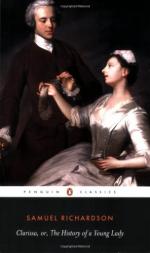But I need not say more on this head: nor perhaps was it necessary to say so much; since the charitable bequests in her will sufficiently set forth her excellence in this branch of duty.
She was extremely moderate in her diet. ‘Quantity in food,’ she used to say, ’was more to be regarded than quality; that a full meal was the great enemy both to study and industry: that a well-built house required but little repairs.’
But this moderation in her diet, she enjoyed, with a delicate frame of body, a fine state of health; was always serene, lively; cheerful, of course. And I never knew but of one illness she had; and that was by a violent cold caught in an open chaise, by a sudden storm of hail and rain, in a place where was no shelter; and which threw her into a fever, attended with dangerous symptoms, that no doubt were lightened by her temperance; but which gave her friends, who then knew her value, infinite apprehensions for her.*
* In her common-place book she has the following note upon the recollection of this illness in the time of her distress:
’In a dangerous illness, with which I was visited a few years before I had the unhappiness to know this ungrateful man! [would to Heaven I had died in it!] my bed was surrounded by my dear relations—father, mother, brother, sister, my two uncles, weeping, kneeling, round me, then put up their vows to Heaven for my recovery; and I, fearing that I should drag down with me to my grave one or other of my sorrowing friends, wished and prayed to recover for their sakes.—Alas! how shall parents in such cases know what to wish for! How happy for them, and for me, had I then been denied to their prayers! But now I am eased of that care. All those dear relations are living still—but not one of them (such as they think, has been the heinousness of my error!) but, far from being grieved, would rejoice to hear of my death.’
In all her readings, and her conversations upon them, she was fonder of finding beauties than blemishes, and chose to applaud but authors and books, where she could find the least room for it. Yet she used to lament that certain writers of the first class, who were capable of exalting virtue, and of putting vice out of countenance, too generally employed themselves in works of imagination only, upon subjects merely speculative, disinteresting and unedifying, from which no useful moral or example could be drawn.
But she was a severe censurer of pieces of a light or indecent turn, which had a tendency to corrupt the morals of youth, to convey polluted images, or to wound religion, whether in itself, or through the sides of its professors, and this, whoever were the authors, and how admirable soever the execution. She often pitied the celebrated Dr. Swift for so employing his admirable pen, that a pure eye was afraid of looking into his works, and a pure ear of hearing any thing quoted from them. ’Such authors,’




